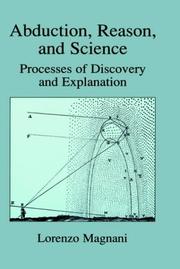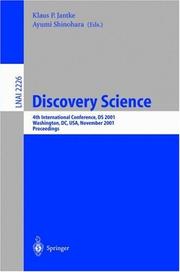| Listing 1 - 2 of 2 |
Sort by
|

ISBN: 0306465140 1461346371 144198562X Year: 2001 Publisher: New York (N.Y.): Kluwer
Abstract | Keywords | Export | Availability | Bookmark
 Loading...
Loading...Choose an application
- Reference Manager
- EndNote
- RefWorks (Direct export to RefWorks)
This volume explores abduction (inference to explanatory hypotheses), an important but neglected topic in scientific reasoning. My aim is to inte grate philosophical, cognitive, and computational issues, while also discuss ing some cases of reasoning in science and medicine. The main thesis is that abduction is a significant kind of scientific reasoning, helpful in delineating the first principles of a new theory of science. The status of abduction is very controversial. When dealing with abduc tive reasoning misinterpretations and equivocations are common. What are the differences between abduction and induction? What are the differences between abduction and the well-known hypothetico-deductive method? What did Peirce mean when he considered abduction a kind of inference? Does abduction involve only the generation of hypotheses or their evaluation too? Are the criteria for the best explanation in abductive reasoning epis temic, or pragmatic, or both? How many kinds of abduction are there? The book aims to increase knowledge about creative and expert infer ences. The study of these high-level methods of abductive reasoning is situ ated at the crossroads of philosophy, epistemology, artificial intel1igence, cognitive psychology, and logic; that is, at the heart of cognitive science. Philosophers of science in the twentieth century have traditionally distin guished between the inferential processes active in the logic of discovery and the ones active in logic of justification.
Abduction (Logic) --- Discoveries in science --- Science --- -681.3*I23 --- Natural science --- Science of science --- Sciences --- Breakthroughs, Scientific --- Discoveries, Scientific --- Scientific breakthroughs --- Scientific discoveries --- Creative ability in science --- Research --- Logic --- Reasoning --- Syllogism --- Philosophy --- Deduction and theorem proving: answer/reason extraction; reasoning; resolution; metatheory; mathematical induction; logic programming (Artificial intelligence) --- Discoveries in science. --- Philosophy. --- 681.3*I23 Deduction and theorem proving: answer/reason extraction; reasoning; resolution; metatheory; mathematical induction; logic programming (Artificial intelligence) --- Abduction (Logic). --- 681.3*I23 --- Normal science --- Philosophy of science --- Philosophy and science. --- Logic. --- Cognitive psychology. --- History. --- Philosophy of Science. --- Cognitive Psychology. --- History, general. --- Psychology, Cognitive --- Cognitive science --- Psychology --- Argumentation --- Deduction (Logic) --- Deductive logic --- Dialectic (Logic) --- Logic, Deductive --- Intellect --- Thought and thinking --- Science and philosophy --- Annals --- Auxiliary sciences of history --- Methodology

ISBN: 3540456503 3540429565 Year: 2001 Publisher: Berlin, Heidelberg : Springer Berlin Heidelberg : Imprint: Springer,
Abstract | Keywords | Export | Availability | Bookmark
 Loading...
Loading...Choose an application
- Reference Manager
- EndNote
- RefWorks (Direct export to RefWorks)
These are the conference proceedings of the 4th International Conference on Discovery Science (DS 2001). Although discovery is naturally ubiquitous in s- ence, and scientific discovery itself has been subject to scientific investigation for centuries, the term Discovery Science is comparably new. It came up in conn- tion with the Japanese Discovery Science project (cf. Arikawa's invited lecture on The Discovery Science Project in Japan in the present volume) some time during the last few years. Setsuo Arikawa is the father in spirit of the Discovery Science conference series. He led the above mentioned project, and he is currently serving as the chairman of the international steering committee for the Discovery Science c- ference series. The other members of this board are currently (in alphabetical order) Klaus P. Jantke, Masahiko Sato, Ayumi Shinohara, Carl H. Smith, and Thomas Zeugmann. Colleagues and friends from all over the world took the opportunity of me- ing for this conference to celebrate Arikawa's 60th birthday and to pay tribute to his manifold contributions to science, in general, and to Learning Theory and Discovery Science, in particular. Algorithmic Learning Theory (ALT, for short) is another conference series initiated by Setsuo Arikawa in Japan in 1990. In 1994, it amalgamated with the conference series on Analogical and Inductive Inference (AII), when ALT was held outside of Japan for the first time.
Science --- Discoveries in science --- Computer science --- Philosophy --- Breakthroughs, Scientific --- Discoveries, Scientific --- Scientific breakthroughs --- Scientific discoveries --- Computer science. --- Information technology. --- Business --- Philosophy and science. --- Database management. --- Information storage and retrieval. --- Artificial intelligence. --- Computer Science. --- Artificial Intelligence (incl. Robotics). --- Philosophy of Science. --- Database Management. --- Information Storage and Retrieval. --- IT in Business. --- Data processing. --- Creative ability in science --- Research --- Information storage and retrieva. --- Artificial Intelligence. --- Philosophy. --- Information storage and retrieval systems. --- Normal science --- Philosophy of science --- AI (Artificial intelligence) --- Artificial thinking --- Electronic brains --- Intellectronics --- Intelligence, Artificial --- Intelligent machines --- Machine intelligence --- Thinking, Artificial --- Bionics --- Cognitive science --- Digital computer simulation --- Electronic data processing --- Logic machines --- Machine theory --- Self-organizing systems --- Simulation methods --- Fifth generation computers --- Neural computers --- IT (Information technology) --- Technology --- Telematics --- Information superhighway --- Knowledge management --- Data base management --- Data services (Database management) --- Database management services --- DBMS (Computer science) --- Generalized data management systems --- Services, Database management --- Systems, Database management --- Systems, Generalized database management --- Automatic data storage --- Automatic information retrieval --- Automation in documentation --- Computer-based information systems --- Data processing systems --- Data storage and retrieval systems --- Discovery systems, Information --- Information discovery systems --- Information processing systems --- Information retrieval systems --- Machine data storage and retrieval --- Mechanized information storage and retrieval systems --- Computer systems --- Electronic information resources --- Data libraries --- Digital libraries --- Information organization --- Information retrieval --- Business—Data processing. --- Science and philosophy
| Listing 1 - 2 of 2 |
Sort by
|

 Search
Search Feedback
Feedback About UniCat
About UniCat  Help
Help News
News